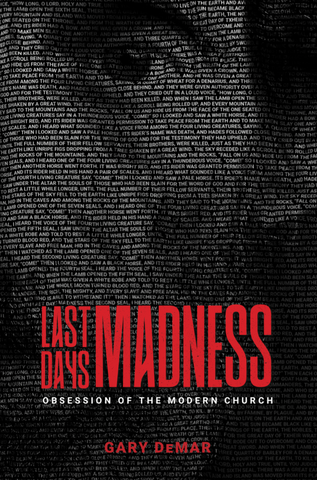Gary responds to a recent post by Dr. Michael Brown on “replacement theology.” Dr. Brown (and most evangelicals with him) are under the impression that God still has promises to fulfill to Israel.
The temple was a constant reminder that a wall separated Jew from Gentile. In Christ, the wall was removed (Eph. 2:11–22). There is no longer any need for the blood of “bulls and goats” (Heb. 10:4; 9:1–28), and thus, no need for a temple of stone or a future, rebuilt, millennial temple as dispensationalism requires. In opposition to this view, Don Stewart and Chuck Missler use more than 230 pages to convince readers that a temple will be rebuilt according to Bible prophecy. What biblical evidence do they offer? Not a single verse states that another temple will be or needs to be rebuilt to fulfill Bible prophecy. The passages from the New Testament that they do cite (Matt. 24:15, 2 Thess. 2:4, and Rev. 11:1–2) were written before the temple was destroyed in A.D. 70. Anyone who read these texts when they were first written would have immediately assumed that they referred to the temple still standing in Jerusalem.
With these facts in mind, the destruction of the temple inaugurates a new era in which “the blood of Christ” cleanses our “conscience from dead works to serve the living God” (Heb. 9:14). Therefore, the expression “end of the age” refers “to the end of the ‘Jewish age,’ i.e., the time of transference from a national [Israel only] to an international people of God [the world],” what the Apostle Paul describes as the “ends of the ages,” a period of time that had come upon the first-century church (1 Cor. 10:11). The phrase the “ends of the ages” is used in the same way by the author of Hebrews: “But now once at the consummation of the ages He has been manifested to put away sin by the sacrifice of Himself” (Heb. 9:26). Jesus was manifested, not at the beginning, but “at the consummation of the ages.” Notice that the text says, “He was manifested,” an event already past. The period between A.D. 30 and 70 is, as the apostle Peter describes it, “these last times” (1 Peter 1:20). As time drew near for Jerusalem’s destruction, Peter could say that “the end of all things was at hand” (4:7). Milton Terry defines “end of the age” in covenantal terms:
It is, according to Matthew’s phraseology, the end or “consummation of the age.”… It is the solemn termination and crisis of the dispensation which had run its course when the temple fell, and there was not left one stone upon another which was not thrown down. That catastrophe, which in Heb. xii, 26, is conceived as a shaking of the earth and the heaven, is the end contemplated in this discourse; not “the end of the world,” but the termination and consummation of the pre-Messianic age.
Again, the Bible establishes the time parameter for when the “end” was to take place. We are told that it was “at hand,” that is “near” for those reading Peter’s letter.

Last Days Madness
In this authoritative book, Gary DeMar clears the haze of "end-times" fever, shedding light on the most difficult and studied prophetic passages in the Bible, including Daniel 7:13-14; 9:24-27; Matt. 16:27-28; 24-25; Thess. 2; 2 Peter 3:3-13, and clearly explaining a host of other controversial topics.
Buy NowGary responds to a recent article by Dr. Michael Brown on “replacement theology.” Dr. Brown (and most evangelicals with him) are under the impression that God still has promises to fulfill to Israel. Despite the New Testament’s clear teaching that far from “replacing” Israel, the New Covenant Church includes both Jews and Gentiles, or “one new man” as Paul says in Ephesians 2.

